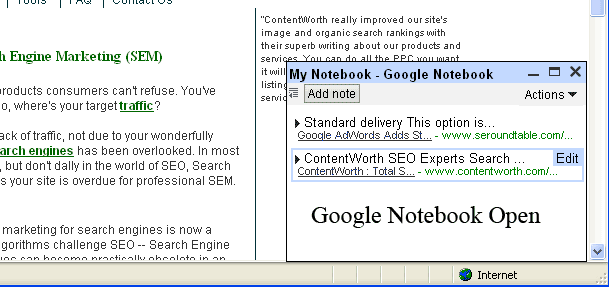Recently Matt Cutts was interviewed by Mike Grehan in a 75 minute podcast. Mike, lucky for some of us without 75 minutes to spare, has supplied us with a run down of the interview. He's also put the interview in two parts onto his site for those who want a listen.
Last night, Matt Cutts was interviewed by Danny Sullivan in a special podcast at 7:15PM. While I caught the tail end last night (I still need to download the full podcast) it seemed like a thorough, if unstructured, interview. Sorry Danny but the giggling and tangents during an interview I had marked on my calendar so as not to forget were quite annoying. Then again, I know how this goes, if I have a problem with how you guys do things I'm free to not listen. I heard another group say such on their show. I turned them off.
A snippet from Matt last night revealed his take on "what's important in the search engines". A lot of chatter on keyword densities, link popularity and link weight, textbook SEO and the like. Matt basically outlined it like this:
Google -- PageRank
Yahoo! -- Paid Inclusion (interesting)
MSN -- textbook SEO
While he did say the above are what he'd rank heaviest in the algorithms they are not the end-all be-all of getting ranked. It came down to, "Have a good, relevant page and/or site" [not exact Matt quotes].
Keyword density Matt said he doesn't pay particular attention to in his daily bloggings and such, mainly because the percentage of good keyword densities is like finding the holy grail. Everyone's got an opinion on where it lies and yet no one can prove they've found it.
Matt's suggestions include: testing, testing, and more testing. Test your keywords and densities, test the number of links (though if you get a relevant link hold on to it!), experiment with demographics and geographics. Just test. Oh, and use your server logs or else all your testing will be for not.
In other Google/Matt Cutts news, BigDaddy is complete. It was completed in March. Sites "falling out of index" now are not due to BigDaddy (by the way, Page noted at Google Press Day they do not call it BigDaddy, but I'm skeptical). The new algorithms just aren't as nice to some as the old ones were. So, although it's been stated time and again, BigDaddy is not to blame any longer -- according to Google. Matt investigated these claims, what a savior, and noted that the new algorithm doesn't reward for weak linking. Reciprical linking to and from weak sites is not highly regarded. Quality links are becoming even more important.
Beware: if you've got reciprical links to irrelevant sites or inbound links to irrelevant sites it may be time to reevaluate the "added value" gained before Google sends up a red flag.
Now I'm going to hunt down last night's podcast and review the 75 mintue podcast. I'll review more later.
If you heard or read these podcasts/interviews please offer your comments and opinions. That man is everywhere, thank goodness, otherwise we'd never know what Google was sticking its fingers in.
Kristen Owen writes for ContentWorth, a full SEM solution.




